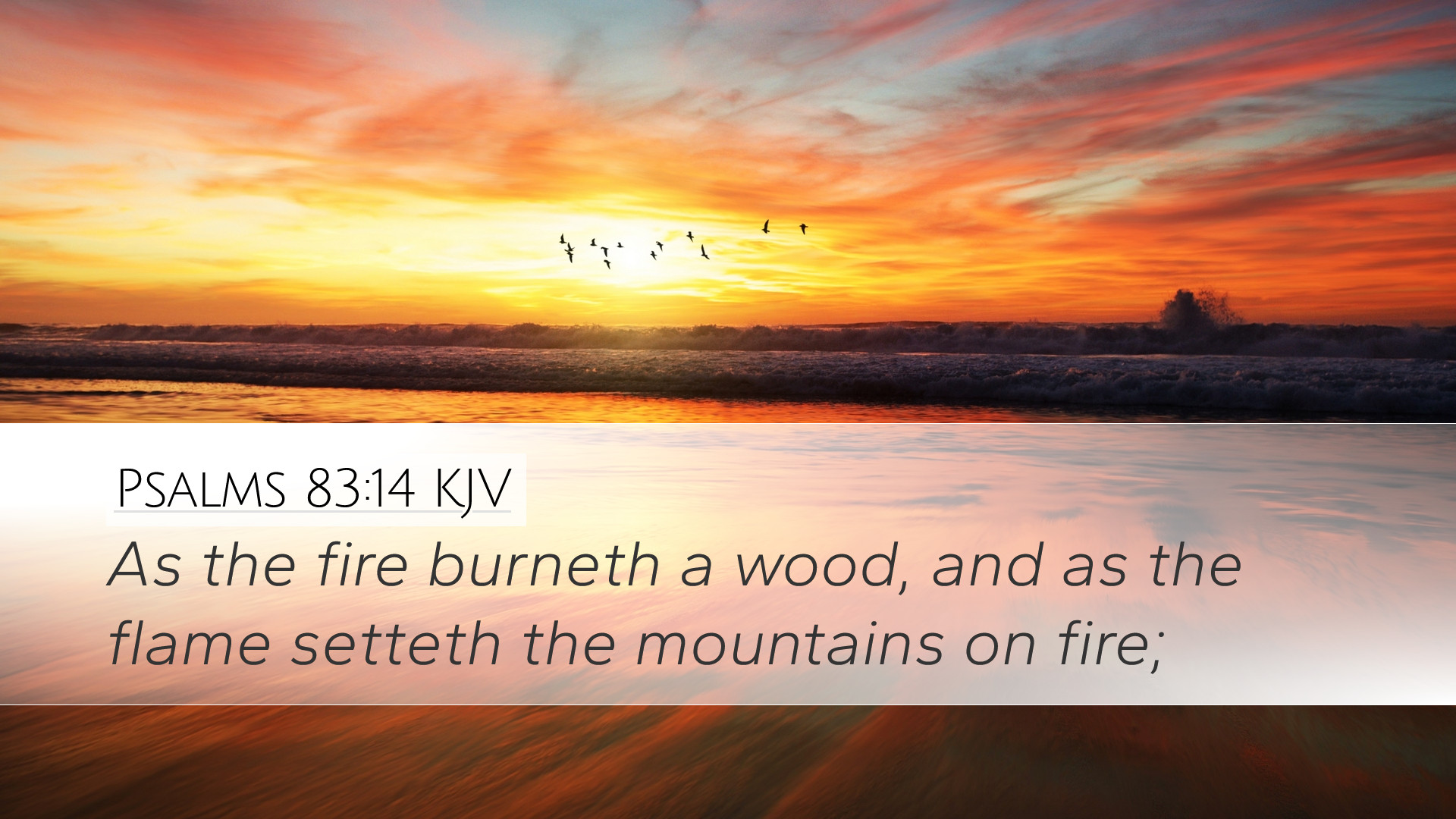Psalms 83:14 Commentary
Bible Verse: "As the fire burneth a wood, and as the flame setteth the mountains on fire;" (Psalms 83:14, KJV)
Introduction
This verse from the Book of Psalms employs vivid imagery to convey the destructive power of fire. In the context of the Psalm, it exemplifies the fierce wrath and judgment of God against His enemies as well as their destructive intent against His people. This commentary synthesizes insights from renowned public domain commentators such as Matthew Henry, Albert Barnes, and Adam Clarke to explore the depth of this verse's meaning for believers today.
Contextual Background
Psalms 83 is classified as a communal lament, where the psalmist calls upon God to act against the nations that conspire against Israel. The historical context suggests a period of approaching danger, possibly during a time when various nations united to threaten the people of God. The metaphor relating to fire in Psalms 83:14 serves to illustrate the nature of the divine intervention the psalmist seeks.
Imagery of Fire
The comparison of God’s judgment to fire is rich with biblical significance. Matthew Henry notes that fire symbolizes both purification and destruction, highlighting God's ability to eliminate evil while refining His people:
- Destructive Power: As fire consumes wood, the verse indicates the totality with which God can eradicate His enemies. Just as a flame envelops and devastates forests and mountains, so will the wrath of God bring ruin to those who oppose Him.
- Purifying Aspect: While destruction is evident, fire can also serve to purify. In a theological sense, God’s judgments can lead to the refinement of His people, separating the righteous from the wicked.
- Imminent Threat: The flame set upon mountains connotes a rapid and catastrophic disaster, indicating that the psalmist perceives the immediate danger posed by surrounding nations.
Theological Insights
Albert Barnes elaborates on the nature of divine retribution, demonstrating that the verse also speaks about the inevitable result of turning against God:
- God's Justice: The verse serves as a reminder of divine justice. Enemies of God's people will face consequences that reflect their transgressions. Barnes points out that although they may seem temporarily prosperous, their ultimate downfall is assured.
- Promise of Deliverance: For believers, the analogy signifies hope. Just as fire destroys what opposes God, so shall His protection extend to the faithful. God’s intervention will not only fulfill justice but also deliver His people from oppression.
Application for Believers
Adam Clarke provides practical insights regarding the application of this passage in the life of a believer:
- Awareness of Opposition: Christians are called to recognize that opposition to God’s purposes often manifests through various forms of hostility. Understanding this backdrop encourages vigilance in the faith.
- Faith in God’s Sovereignty: The assurances of God’s imminent justice motivate believers to trust in His sovereign capability to enact judgment when necessary.
- Call to Prayer: The communal aspect of the psalm emphasizes the importance of collective prayer in facing adversities. It reminds believers to unite before God, seeking His intervention in times of conflict.
Conclusion
Psalms 83:14 employs the powerful metaphor of fire to describe God's decisive and purifying response to those who rise against His covenant people. The insights from Matthew Henry, Albert Barnes, and Adam Clarke help deepen our understanding of divine justice, the hope for deliverance, and the call for active faith amidst adversity. This verse not only reminds us of God’s capacity for judgment but also reflects His steadfast protection over those who remain faithful. The fervor of the imagery reinforces the urgency of seeking God’s help and the assurance of His deliverance in times of distress.


